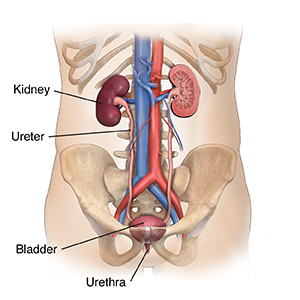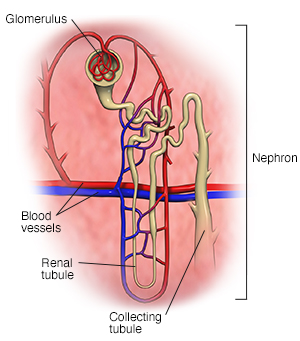How do the kidneys work?
The body takes nutrients from food and converts them to energy. After the body has used all the food components that it needs, waste products are left behind in the bowel and in the blood.
The kidneys and urinary system help to excrete the waste products. They also keep chemicals, such as potassium and sodium, and water in balance. Kidneys filter and remove several toxic materials from the body that are the products of food metabolism. These waste materials can cause problems in the body if they build up. The kidneys also control the fluid and acid-base balance in the body
The kidneys are 2 bean-shaped organs. They are located below the ribs toward the middle of the back. Their function is to:
-
Remove liquid waste from the blood in the form of urine
-
Keep a stable balance of chemicals, such as salts and other substances in the blood
The kidneys remove waste products called urea from the blood through tiny filtering units called nephrons. There are about one million nephrons in each kidney. Each nephron consists of a ball formed of small blood capillaries, called a glomerulus, and a small tube called a renal tubule. Blood enters the glomerulus and is filtered there. This filtered fluid then passes through the tubule where substances and water are added or removed. The fluid that remains is urine.
Once the urine is formed, it passes through the nephrons and down the renal tubules of the kidney. Urine collects in the calyces and flows into the renal pelvis and then flows into the ureter. From here it flows down into the bladder.
Along with filtering waste from the blood and helping in the balance of fluids and other substances in the body, the kidneys do other vital functions. The kidneys:
-
Release hormones, such as renin, that help to regulate blood pressure
-
Make erythropoietin, a hormone that aids formation of red blood cells
-
Convert vitamin D into a form that can be used by the body's tissues
-
Interact with corticosteroids (made by the adrenal glands that sit on top of each kidney) that help to regulate kidney function and the body’s inflammatory response system


What is nephrology?
Nephrology is the branch of medicine concerned with the diagnosis and treatment of conditions related to the kidneys. Healthcare providers who specialize in kidney disease are called nephrologists. Other health providers who treat kidney problems include primary care providers, pediatricians, transplant specialists, and urologists.
What causes problems with the kidneys?
Problems with the kidneys may include health conditions, such as kidney failure, kidney stones, and kidney cancer. These problems with the kidneys may be caused by:
-
Aging. As we age, changes in the structure of the kidneys can cause them to lose some of their ability to remove wastes from the blood. The muscles in the ureters, bladder, and urethra also tend to lose some of their strength. But this alone does not cause chronic kidney diseases.
-
Illness or injury. Damage to the kidneys caused by illness, inflammation, immune responses, or an injury can also prevent them from filtering the blood completely or block the passage of urine. Diabetes and high blood pressure (hypertension) are leading causes of kidney disease.
-
Toxicity. The kidneys may be damaged by substances, such as certain medicines, a buildup of some substances in the body, or toxic substances such as poisons.
What are the symptoms of kidney disease?
Each person may have different symptoms. But these are the most common symptoms of kidney disease:
-
Frequent headaches
-
Fatigue
-
Itchiness all over the body
-
Blood in the urine
-
Loss of appetite
-
Nausea and vomiting
-
Puffiness around eyes, swelling of hands and feet
-
Skin may darken
-
Muscle cramps or pain in small of back just below the ribs (not aggravated by movement)
-
High blood pressure
These symptoms may look like other health problems. Always talk with your healthcare provider for a diagnosis.